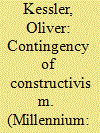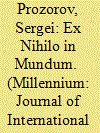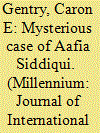|
|
|
Sort Order |
|
|
|
Items / Page
|
|
|
|
|
|
|
| Srl | Item |
| 1 |
ID:
147711


|
|
|
|
|
| Summary/Abstract |
This article argues that constructivism has not engaged with the concept of contingency sufficiently. While such noted constructivists as Onuf, Kratochwil, and Wendt often refer to ‘double contingency’, it is the concept of ‘norms’ rather than ‘contingency’ that is used to characterise constructivist theorising in International Relations (IR). In this article, I outline how moderate and radical constructivists differ in their take on norms and thereby establish how the problem of contingency is actually at the core of constructivist theorising. The discussion then shows how Kratochwil, Onuf, and Wendt have made use of double contingency while moderate constructivists have re-introduced the single actor to show how norms ‘cause’ action. The third part moves beyond the double contingency framework. By differentiating ‘the social’ from ‘society’, this section shows that a ‘third’ position can be identified. The concept of ‘triple contingency’ then could be a way ahead for the theoretical discussion on constructivism itself.
|
|
|
|
|
|
|
|
|
|
|
|
|
|
|
|
| 2 |
ID:
147712


|
|
|
|
|
| Summary/Abstract |
In this reply to Vassilios Paipais’s review of my Void Universalism books I focus on two main points of my disagreement with Paipais. The first concerns the possibility of deriving universalist axioms of world politics from the ontology of the void discussed in the first volume, Ontology and World Politics. While Paipais rejects such a possibility and posits a contentless ontology of the political, I argue that it is possible to derive from void ontology the political axioms of community, equality and freedom understood as attributes of indiscernible ‘whatever being’. The second pertains to the limitations on the world-political subject addressed in the second volume, Theory of the Political Subject. While Paipais is entirely correct in arguing that my notion of political subjectivity combines purism on the level of content with prudentialism with regard to form, I demonstrate that this combination is not a contradiction but is rather the precondition of politics as free praxis, whereby the politicisation of particular worlds in accordance with universal axioms always remains up to the subject.
|
|
|
|
|
|
|
|
|
|
|
|
|
|
|
|
| 3 |
ID:
147709


|
|
|
|
|
| Summary/Abstract |
When Aafia Siddiqui ‘disappeared’ from her upper-middle class life in Boston in 2003 due to accusations that she was involved in al Qaeda, competing narratives from the US government, media, and her family emerged striving to convince the American public of her guilt or innocence. These narratives were rooted in a gendered form of neo-Orientalism that informed and structured the War on Terror. The narratives, of innocent Soccer Mom, nefarious Lady al Qaeda, and mentally fragile Grey lady, sought to explain how a well-educated woman could possibly be involved with a terrorist organisation. This article uses intertextual analysis to draw parallels between Gothic literature and the Siddiqui narratives. Gothic literature’s dependency upon gendered unease is particularly evident in the Siddiqui narratives, which then reveal the uncertainties within the War on Terror, particularly those related to American exceptionalism.
|
|
|
|
|
|
|
|
|
|
|
|
|
|
|
|
| 4 |
ID:
147710


|
|
|
|
|
| Summary/Abstract |
This article explores practices of writing deployed in an attempt (sometimes futile) to mitigate and interrogate the relationship between researcher and informant across the unequal relations of power, economic disparities, and cultural divides – factors that create a partial and committed position for the author. In the process, and through the lens of an ethnographic study of sexual-affective economies in contemporary Cuba, storytelling emerges as a method and methodology for International Relations that facilitates (re)presentation of interviews that are unstructured, contingent, and difficult. Storytelling as a method and methodology reveals the multiplicity, contingency, and uncertainty of the research process, questioning the incitements to detachment and objectivity on which IR methodologies are built. Thus, narrative writing proves invaluable for expressing how the international acts on bodies (and vice versa), and for relating personal experiences of repression and resistance, joy and pain, in an international frame. Far from a merely stylistic choice, storytelling bears real ethical and political implications – for the research produced and for the individual subjects implicated in its production. Along the way, practices of writing themselves come to the fore, as academic conventions fall away and stories surface. Storytelling itself thus elaborates on the possibilities inherent in more creative, less structured, and more interpretive writing across the field of international politics.
|
|
|
|
|
|
|
|
|
|
|
|
|
|
|
|
|
|
|
|
|